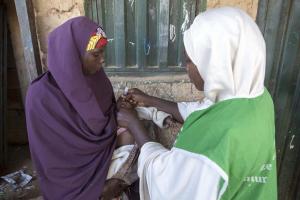Frontline workers in Nigeria break down gender related barriers to reach children with vaccines
Abuja, 01 August 2018 - In a remote village in Northern Nigeria, a group of female polio health workers visit the home of Hauwa Abubakar. A young mother of triplets, two girls and one boy, Hauwa quickly carries her son to another room, locks him up and returns with her daughters for the polio vaccines.
The health workers in confusion asks Hauwa why she hid her son. “He is my only son,” she says with confidence. “He will grow up and continue my family lineage. As for these girls, I’ll give them away to another family when they turn 18,” she laughs. The health workers are perplexed by Hauwa’s ignorance, but in order not to create any drama, they politely tell Hauwa to bring her son out for immunization.
“Boys or girls, your children all need polio immunization. Please don’t discriminate when it comes to matters of health. You never know who your daughters will become one day, and you never know what disease you are protecting your son from,” the lead health worker politely tells Hauwa as she administers the polio vaccines in the girls’ mouths. With a sullen face, Hauwa quietly brings her son out for the polio vaccination.
Hauwa’s behavior is a typical replication of what obtains in some homes that are resistant to immunization. Being a predominantly patriarchal society, Nigeria has experienced gender segregation in all spheres of society. It is further influenced and shaped by the cultural and religious beliefs of the people that promotes the segregation of men and women along gender lines. To address the gender dimension of vaccination, the polio programme which is coordinated at the national level by the Emergency Operations Centre(EOC), is presently working with the Global Polio Eradication Initiative (GPEI), partners to develop a gender strategy that addresses the gender inequalities in immunization while at the same time working to respond to the challenges of gender inequality in vaccination.
Dr Usman Adamu, the Incident Manager at the National EOC explains “the national guideline for supplementary immunization activities (SIA) is every clear. All house to House vaccination team members for the polio campaign must be females. This is because we want to reach all eligible children with polio vaccines irrespective of whether children inside or outside the house. Having a female team member makes it easy to reach these children in the household”.
Female polio workers do not only help to break down the barriers of female seclusion (a practice that secludes women and restricts their movement in Northern Nigeria), they also provide important information about immunization and other health related interventions available at the health facilities during their interactions with caregivers in the household. Female polio workers are instrumental in building trust in their communities and encouraging vaccination.
Development of a Gender Strategy by GPEI
The GPEI in close working with WHO and other partners is currently working to develop a gender strategy for the polio programme. The strategy is expected to guide endemic countries including Nigeria to identify and respond to gender related barriers to immunization and interventions to address the challenges.
The Team leader of the WHO Immunisation Cluster, Dr Fiona Braka states that “WHO recognises that gender roles and norms, are powerful determinants of health outcomes and has recently developed gender-sensitive indicators that are regularly tracked and reported on bi-annually. These gender-sensitive indicators measure the equal reach of girls and boys in vaccination campaigns, the doses of polio vaccine received by girls and boys, the timeliness of disease surveillance for girls and boys and women’s participation as front-line workers in polio-endemic countries.”
Nigeria polio immunization programme currently collects sex-disaggregated data in order to track progress towards gender equality a prerequisite for reaching SDG 3.
Kindly follow us on Social Media:



